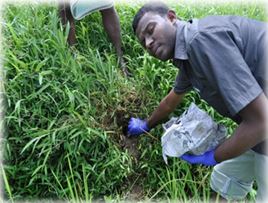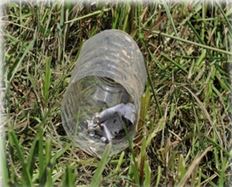Rodent control in paddy
Technology brief
Rodents are persistent pests in the island ecosystem. They plunder field crops, rice in particular and also cause severe damage to plantation crops. Following management measures are suggested for controlling rodent menace in the Andaman and Nicobar islands.
Cultural practices: Deep ploughing should be done at the time of land preparation to destroy hidden burrows. Bunds should be trimmed to avoid new burrow formations. Weed free cultivation can reduce the rodent infestations to certain level. Periodical trapping and killing of rodents in paddy fields using mechanical traps also avoid rodent menace. In case of storage, keeping the storage area very clean, immediate removal of any spilled over grains, periodical mechanical trapping, and usage of modern storage structures or metal bins which is not having direct contract with floor instead of traditional wooden storage bins helps in reduction of rodent infestations.
Chemical management of Rodents:Locating live burrows in field is the preliminary step before using rodenticides. All the burrows seen in particular field area/storage area have to be closed with soil. Those burrows reopened by rodents will be considered as live burrows. Bromodiolone (0.005%) cake which is commonly available as Rat Kill in retail shops can be placed directly in live burrows. This method does not involve pre-baiting. In severe infestations zinc phosphide (2%) can be used with safety precautions. It involves two steps viz. pre-baiting and poison baiting.
Pre-baiting:
Baiting should be done 2-3 times without any poison to attract rodents and habituate animal towards the bait.
One kg of broken rice is mixed uniformly with 20 g of vegetable oil and packed in to small packets in newspaper and kept in live burrows.
This step is to be repeated twice or thrice before poison baiting.
Poison baiting
This should be practiced after 2-3 times of pre baiting.
Uniform mixing of 20g of zinc phosphide + 20g vegetable oil + 900 g of broken rice is used as poison bait.
Scope
It is suitable for rodent management in rice under rainfed lowland ecosystem of A& N Islands.
Cost
Rs. 200/ha
Benefit
It is high yielding effective for management of rodent in paddy fields.
Source
Director, Central Island Agricultural Research Institute, Port Blair-744 101, Andaman and Nicobar Islands.




